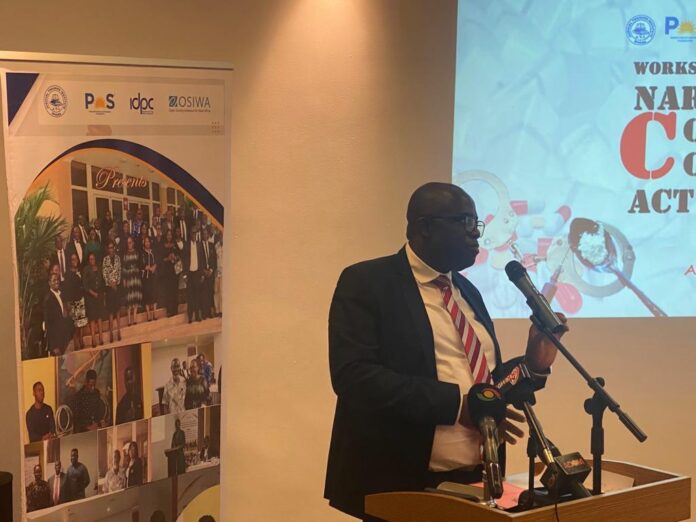POS Foundation Engages Judges, magistrates On New Narcotics Control Act 2020 (Act 1019)
The POS Foundation held a one-day workshop on the new Narcotics Control Commission Act,2020(Act 1019). The workshop was held on the theme role of judges and Magistrates in the Health, Rights-based best practices in handling people who used drugs in the implementation of the Act.
This has been designed and structured to equip Judges and Magistrates with changes that have been brought by the Narcotics Control Commission Act, 2020(Act 1019) and the different jurisdiction given by the Act to the Trial Courts.
The Narcotics Control Commission Act 2020, Act 1019 was passed on 20th March 2020 and assented to by the President on 11th May 2020. The new law represents an important example for drug policy reform advocacy in West Africa. Historically, drug policies have been imported to our region, and it is a colonial legacy that we have seen drug production and trafficking skyrocket; which offers further evidence that drug laws do not work.
Addressing the media, The Director of Prisons in charge of Health, Mr. Samuel Adjei- Attah commented that the Ghana Prison Service has over the years been advocating for alternatives to imprisonment or other forms of interventions in a bid to decongest the prisons. He said the effect of overcrowding on proper prison classification and effective reformation and rehabilitation, among others, could not be over-emphasized.
According to him, it was heartwarming that the Narcotics Control Commission Act 2020(1019) had made provision for alternatives to imprisonment, including fines for the offenses of drug possession for personal use. However, the Service still receives persons convicted and sentenced to prison for the offense of use of narcotic drugs, he said.
“As of May 26, 2022, persons convicted for narcotics and drug-related offenses account for 3.8 percent of the convict population of 12, 602 nationwide, of which majority of them were in their youthful age between 18 to 35 years.”
Mr. Adjei-Attah assured the Services’ support for appropriate alternatives to imprisonment for such people and advocated that groups of users should be referred to the appropriate rehabilitation centers for treatment instead of incarceration, considering the risk of contamination and other challenges for such people.
Mr. Jonathan Osei Owusu, Executive Director POS Foundation, said the workshop aimed to sensitize critical stakeholders, particularly judges of the Lower and higher courts, to know their roles in the Narcotics Drug Act delivery, while consulting them on the best practices in the implementation process.
He said the new law represented an important example for drug policy reform advocacy in West Africa and sought to treat drug use and dependency as a public health issue rather than focusing on law enforcement, incarceration, punishment, and repression.
He said Ghana’s criminal justice system was the envy of many countries in Africa, adding, however, that there were still so many legislative and policy loopholes that needed to be blocked.
“Our aim is to find a way to decongest the prisons rather than building more prison facilities, and to ensure that drug use is treated as a public health issue.”
- President Commissions 36.5 Million Dollars Hospital In The Tain District
- You Will Not Go Free For Killing An Hard Working MP – Akufo-Addo To MP’s Killer
- I Will Lead You To Victory – Ato Forson Assures NDC Supporters
Visit Our Social Media for More



